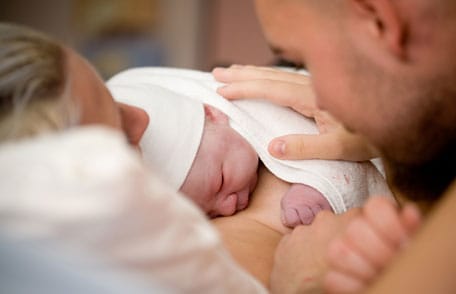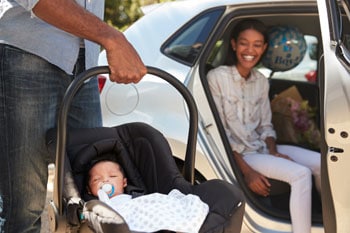Best at Birth: Get Your Baby the Hepatitis B Vaccine

Ensure your baby gets the hepatitis B vaccine shortly after birth. The CDC, American Academy of Pediatrics and the American Academy of Family Physicians recommend all children receive their first dose of hepatitis B vaccine shortly after birth and complete the vaccine series by age 6–18 months.
Babies and Hepatitis B
Hepatitis B is an infectious liver disease caused by the hepatitis B virus. Some people are able to fight the infection and clear the virus. For others, the infection remains and is “chronic,” or lifelong. Over time, the chronic hepatitis B can cause serious health problems, and even liver cancer. There is no cure for hepatitis B.
Mothers can pass the hepatitis B virus to their baby during childbirth without knowing it, since it is passed through blood and bodily fluids. Babies can also get hepatitis B through blood or other body fluids that contain a small amount of blood from an infected person. People can spread the virus even when they have no symptoms.
Why Does My Baby Need to Get the Vaccine So Young?
It’s hard to imagine putting your newborn through the pain of a shot. But a little stick early in life is an important first step to protecting your baby against a deadly disease. All babies should get the first shot of hepatitis B vaccine shortly after birth. This shot acts as a safety net, reducing the risk of getting the disease from moms or family members who may not know they are infected with hepatitis B.
This is very important because the younger a baby is when infected with the hepatitis B virus, the greater his or her chance of developing chronic hepatitis B. Even though many babies who get hepatitis B don’t show symptoms, babies with hepatitis B have a 90% chance of developing chronic hepatitis B, which is a lifelong disease. Approximately 1,800 people die every year from hepatitis B-related liver disease. Give your baby the best protection against this serious disease with the hepatitis B vaccine shortly after birth, and complete the vaccine series by age 6-18 months.
When a mom has hepatitis B, there’s an additional medicine that can help protect the baby against hepatitis B, called hepatitis B immune globulin (HBIG). HBIG gives a baby’s body a “boost” or extra help to fight the virus as soon as he is born. This shot works best when the baby gets it within the first 12 hours of his life. The baby will also need to complete the full hepatitis B vaccination series for best protection.
To learn more about hepatitis B, talk with your child’s doctor or visit the hepatitis B disease page.
Is the Hepatitis B Vaccine Safe?
The hepatitis B vaccine is very safe and it is effective at preventing hepatitis B. Vaccines, like any medicine, can have side effects, but serious side effects caused by the hepatitis B vaccine are extremely rare. Most people who get the hepatitis B vaccine will have no side effects at all. When side effects occur, they are often very mild, like a low grade fever (less than 101 degrees) or a sore arm from the shot. Since the vaccine became available in 1982, more than 100 million people have received hepatitis B vaccine in the United States and no serious side effects have been reported. Ultimately, the potential risks associated with hepatitis B are much greater than the risks of getting the vaccine.
How Many Doses of the Vaccine Will My Baby Need?
After the first dose shortly after birth, your baby will need two more doses of the vaccine for best protection. Talk to your child’s doctor about when your child should get the next shot. Typically, children get one dose at each of the following ages:
- Shortly after birth
- 1 through 2 months
- 6 through 18 months






















.png)












No hay comentarios:
Publicar un comentario